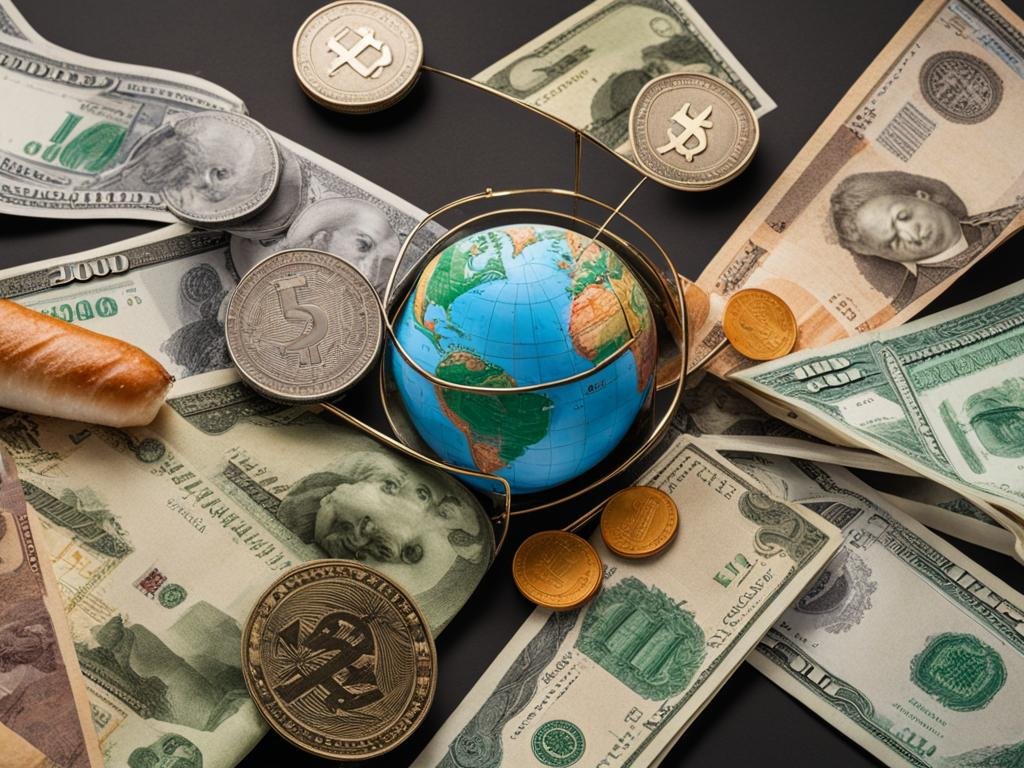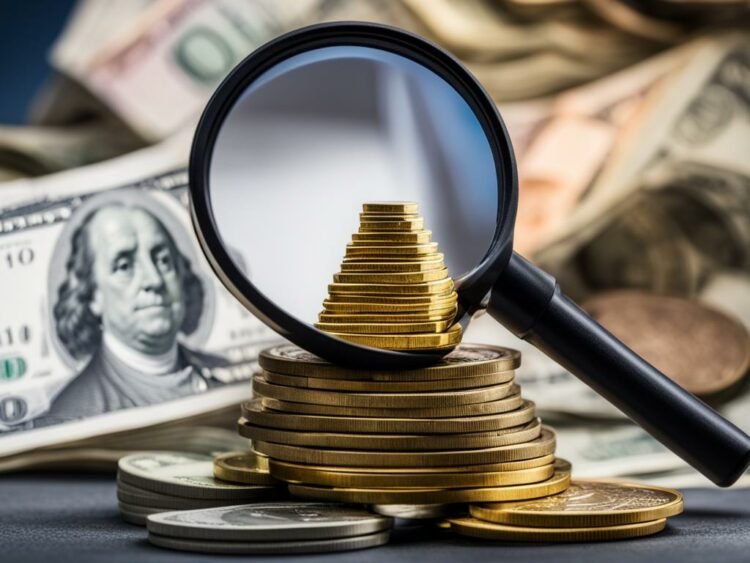Planning a trip abroad? One important aspect to consider is currency exchange. Getting the best rates and avoiding hidden fees can save you money and ensure a hassle-free experience. Here are some valuable tips to help you navigate the currency exchange process.
Key Takeaways:
- Exchange money at your bank or credit union for better rates and fewer fees.
- Use your financial institution’s ATMs abroad to minimize fees.
- Avoid airport kiosks and exchange houses for unfavorable rates and high fees.
- Consider applying for a credit card with no foreign transaction fees.
- Choose to pay in the local currency to avoid currency conversion fees.
By following these currency exchange tips, you can maximize your savings and make the most of your international travels.
Exchanging Currency: Start with Your Bank
When it comes to exchanging currency, starting with your bank is often the smartest choice. Most banks offer currency exchange services to their customers, with reasonable rates and low fees. By using your bank, you can have peace of mind knowing that you’re dealing with a trusted institution.
Before exchanging your currency, it’s a good idea to check the current exchange rates using a reliable source like Reuters. This will give you a better understanding of the market rates and help you make an informed decision.
Your bank provides various options for currency exchange. You can visit a branch in person, call their helpline, or even utilize their online platform for convenient delivery or pickup. Ordering currency through your bank ensures that you’re getting fair rates and reliable service.
If you prefer to explore online options, there are currency converters available on the internet. However, keep in mind that these converters may offer less favorable rates and may come with additional delivery charges.
So, when it comes to exchanging currency, it’s always a good idea to start with your bank. They offer reasonable rates, low fees, and the convenience of multiple channels for currency exchange.
Where to Get Foreign Currency Outside the U.S.
When traveling abroad, it’s important to know where you can get foreign currency to ensure you have the cash you need for your trip. Here are some key options to consider:
- Your bank’s ATM network: Using your bank’s ATMs when you’re abroad can be a convenient and cost-effective way to get foreign currency. Most major banks have partnerships with international banks, allowing you to withdraw cash in the local currency without excessive fees.
- Local ATMs: If your bank doesn’t have in-network ATMs or branches in your destination country, you can still use your debit card at a local ATM. Be aware that fees may apply, so it’s a good idea to check with your bank about any additional charges.
While some travelers may consider airport kiosks or other exchange houses, it’s worth noting that these options usually have poor exchange rates and high fees. To get the best rates, it’s generally best to avoid them if possible.
Remember, using your bank’s ATM network or local ATMs is often your best bet for competitive exchange rates and low fees when you’re outside the U.S.
By planning ahead and knowing where to get foreign currency, you can make sure you have the cash you need for your travels without incurring unnecessary fees or getting unfavorable exchange rates.

Skip Currency Exchange: Use a Credit or Debit Card
If you’re looking for a convenient and cost-effective way to handle your international transactions, consider using a credit or debit card instead of exchanging currency. With the right card, you can skip the hassle of finding a currency exchange location and enjoy the benefits of using plastic overseas.
Using a credit or debit card eliminates the need to carry large amounts of cash, reducing the risk of loss or theft. Plus, it offers fraud protection, providing an additional layer of security for your purchases.
When using your card abroad, it’s important to choose the right payment method. Some credit cards charge foreign transaction fees, which can add up quickly. To avoid these fees, look for a card that offers no foreign transaction fees. Additionally, be cautious when using a credit card for ATM cash withdrawals, as this can incur high fees and interest charges.
Benefits of Using a Credit or Debit Card:
- No need to carry large amounts of cash
- Fraud protection for your purchases
- Avoid foreign transaction fees with the right card
When making purchases abroad, you may encounter the option to pay in either the local currency or your home currency (such as U.S. dollars). It’s generally recommended to choose the local currency to avoid currency conversion fees. While paying in your home currency may seem more convenient, it often comes with unfavorable exchange rates and additional fees.
By using a credit or debit card with no foreign transaction fees and making wise choices when paying in foreign currencies, you can save money and enjoy a hassle-free experience during your travels.
Exchange Frequently? Consider a Multicurrency Account
If you frequently travel or work abroad, a multicurrency account can be a game-changer for managing your finances. Fintech companies like Wise and Revolut offer multicurrency accounts that allow you to hold, spend, and receive multiple currencies, all in one convenient place.
With a multicurrency account, you can avoid the hassle of constantly exchanging money and dealing with fluctuating exchange rates. Instead, you can keep your funds in different currencies, so you’re always prepared for your next international adventure. Plus, you’ll have the flexibility to switch between currencies whenever you need to, without incurring additional fees.
Having a multicurrency account can save you both time and money. It eliminates the need to carry large amounts of cash or rely on expensive currency exchange services. You’ll also have the peace of mind knowing that you’re getting competitive exchange rates and low fees.
Some multicurrency accounts even come with additional perks, such as free international money transfers or virtual debit cards that can be used worldwide. These features make managing your finances while traveling or working abroad even more convenient.
So, if you find yourself frequently jetting off to different countries or regularly dealing with multiple currencies, it’s worth considering a multicurrency account. It’s a smart financial tool that can streamline your international transactions and help you save money in the process.

The Best Place to Exchange Currency at the End of Your Trip
When your trip is coming to an end, you might find yourself with leftover foreign currency that you want to exchange back into your home currency. The best place to exchange currency at the end of your trip is often your bank. However, it’s important to note that not all banks accept every type of foreign currency, so it’s a good idea to check with your bank beforehand.
If your bank doesn’t accept the foreign currency you want to exchange, you have a few other options. You can try visiting a currency exchange store, which is a specialized establishment that deals specifically with currency exchange. Another option is an airport kiosk, which can be convenient if you’re already at the airport. However, keep in mind that these places may not offer the most favorable exchange rates.
If your bank doesn’t accept the foreign currency you want to exchange, you can try a currency exchange store or an airport kiosk, although the rates may not be as favorable.
Alternatively, if you’re feeling generous, you can choose to donate your unused foreign currency. Many airports have donation boxes where you can contribute your leftover coins and bills. Additionally, organizations like UNICEF have programs such as “Change for Good” that allow you to mail in your unused foreign currency as a donation.
Overall, the best place to exchange currency at the end of your trip is usually your bank. But if that’s not an option, currency exchange stores or airport kiosks can be viable alternatives. And if you’re feeling charitable, consider donating your unused foreign currency to a good cause.
Conclusion
By following these currency exchange tips, you can ensure you get the best rates and avoid hidden fees. Start by exchanging money at your bank before your trip, as they typically offer better rates and fewer fees compared to other options. Consider checking if your bank will buy back any leftover currency when you return.
While abroad, use your financial institution’s ATMs for minimal fees and competitive exchange rates. Avoid using airport kiosks or other exchange houses, as they often have poor rates and high fees. Additionally, applying for a credit card with no foreign transaction fees can help you save on fees when making purchases abroad. Remember to choose to pay in the local currency instead of U.S. dollars to avoid currency conversion fees.
If you frequently travel or work abroad, a multicurrency account can be a convenient option. Fintech companies like Wise and Revolut offer multicurrency accounts that allow you to hold, spend, and receive multiple currencies, helping you avoid fluctuating exchange rates and fees.
Finally, when it’s time to exchange any leftover foreign currency, your bank is often the best place to go. However, if your bank doesn’t accept the currency you want to exchange, you can try a currency exchange store or an airport kiosk, although the rates may not be as favorable. Alternatively, you can donate your unused foreign currency at the airport or mail it to organizations like UNICEF’s Change for Good program.
FAQ
Where is the best place to exchange currency before my trip?
It is recommended to exchange currency at your bank or credit union, which likely offers better rates and fewer fees.
Should I use airport kiosks or other exchange houses for currency exchange?
It is best to avoid airport kiosks or other exchange houses, as they usually have poor rates and high fees.
Can I use my financial institution’s ATMs abroad?
Yes, using your bank’s ATMs abroad can help minimize fees.
How can I save on fees when making purchases abroad?
Consider applying for a credit card with no foreign transaction fees and choose to pay in the local currency instead of U.S. dollars.
What are some trusted sources to check the current exchange rates?
You can check the current exchange rates using trusted sources like Reuters.
Can I order currency online for delivery or pickup?
Yes, most banks offer the option to order currency online for delivery or pickup.
Are online currency converters a good option for exchanging currency?
While online currency converters are available, they often offer less favorable rates and additional delivery charges.
What if my bank doesn’t have in-network ATMs in my destination country?
If your bank doesn’t have in-network ATMs or branches in your destination country, you can use your debit card at a local ATM, though fees may apply.
Should I consider getting a credit or debit card with no foreign transaction fees?
Yes, using a card instead of cash can be safer and offer fraud protection. However, avoid using credit cards for ATM withdrawals to avoid fees and interest charges.
Are there any options for frequent travelers or those who frequently work abroad?
Yes, consider getting a multicurrency account from fintech companies like Wise or Revolut to hold, spend, and receive multiple currencies and avoid fluctuating exchange rates and fees.
What should I do with any leftover foreign currency at the end of my trip?
If your bank doesn’t accept the foreign currency you want to exchange, you can try a currency exchange store or an airport kiosk. Alternatively, you can donate your unused foreign currency at the airport or mail it to organizations like UNICEF’s Change for Good program.

